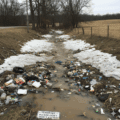
We’ve all seen it: a bag fluttering on the highway, a bottle bobbing in a creek, or a cigarette butt carelessly tossed to the curb. However, litter is a bigger problem than just being unsightly. It threatens wildlife, water quality, and our overall well-being. When you examine the facts about trash, the full extent of its impact becomes evident.
Learn these 10 powerful facts about litter and discover just how bad the problem is and what you can do to help fix it.
It sounds like a bad science fiction movie, but it’s the future we’re heading toward. Every year, millions of tons of plastic waste end up in our waterways, harming marine life and entering our food chain. If this trend continues, we will have more plastic in the sea than fish by 2050.
💡 What you can do:
- Say no to single-use plastics, such as straws, utensils, bags, and wrappers, especially when dining out or shopping.
- Choose packaging free of plastic or products made from recycled materials whenever possible.
A single plastic bag can take up to 1,000 years to break down in a landfill. That means every plastic bag you’ve ever used could still be sitting in a landfill, or worse, in a creek, tree, or on the side of the road. Think about that the next time you see one fluttering in the wind. It might be around long after we’re gone.
💡 What you can do:
- Switch to reusable bags. Keep a stash of canvas, cloth, or recycled plastic totes in your car, purse, or backpack so you’re always prepared.
- Say no to plastic at checkout.
- If you can throw it in your purse or carry it out, skip the bag.
An estimated 4.5 trillion cigarettes are discarded every year. These tiny pieces of trash may seem harmless, but they are toxic. Cigarette butts are made of plastic fibers and contain harmful chemicals that leach into the environment, polluting soil and waterways.
💡 What you can do:
- If you smoke, dispose of it responsibly. Always use designated receptacles or portable pocket ashtrays instead of tossing cigarette butts on the ground.
- Help raise awareness. Many people don’t realize butts aren’t biodegradable. Spread the word! This blog is a great starting point.
Every year, billions of plastic bottles are used once and discarded. However, less than a third of them are ever recycled. The rest? They end up in landfills, rivers, and oceans, where decomposition takes centuries. Many of those are used just once before being tossed.
💡 What you can do:
- Ditch single-use bottles and invest in a durable, reusable water bottle. Americans purchase approximately 50 billion water bottles annually, averaging around 13 per person per month in the United States. That means using a reusable water bottle can save you an average of 156 plastic bottles annually.
- Know where to recycle. In Tennessee, use curbside recycling or local drop-off points whenever possible. Check resources like our recycling page, Nashville.gov, or Memphis Recycles for region-specific information.
Each year, TDOT allocates $35 million from the state’s soft drink and malt beverage tax to fund litter cleanup and prevention programs. While this doesn’t directly impact taxpayer dollars, it still represents a significant portion of funding that TDOT could allocate to enhance and expand other environmental or community initiatives, such as public recycling infrastructure, stormwater management, or beautification projects. Imagine how much more we could accomplish if we all took responsibility for our waste.
💡 What you can do:
- Make litter prevention part of your everyday habits. Dispose of waste properly, secure trash in your vehicle, and pick up litter when you see it.
- You can also volunteer for a cleanup through our events calendar!
Research shows that the average person may unknowingly consume up to 5 grams of plastic every week. That’s about the weight of a credit card. These tiny plastic particles are everywhere, even in the air we breathe and the food we eat. Buying items with little to no packaging
💡 What you can do:
- Skip single-use plastics altogether.
- Using reusable items significantly reduces the amount of plastic in landfills.
Litter is contaminating our rivers, lakes, and streams. It can block the natural flow of water. Additionally, when plastics enter our waterways, they break down into smaller particles known as microplastics. Fish and other marine life consume the plastic, eventually leading up the food chain to humans. This pollution disrupts aquatic life, damages ecosystems, and threatens the quality of our drinking water.
💡 What You Can Do:
- Secure your trash before driving to prevent roadside litter, which often ends up in storm drains that lead to rivers and lakes.
- Join a local waterway cleanup through our event calendar or partner with organizations like Keep TN Rivers Beautiful.
Litter, such as discarded food, plastic bags, six-pack rings, and food wrappers, harms wildlife across Tennessee. Animals mistake litter for food and suffer from digestive blockages, strangulation, or entanglement, all of which can be fatal. Additionally, they mistake it for food or a safe place to nest, which can lead to entrapment or harm.
💡 What you can do:
- Dispose of food wrappers and containers properly.
- Ensure trash bin lids are secure to prevent them from blowing away or being scattered by animals.
- Pack it in and out when hiking, camping, or picnicking.
- Don’t throw food on the ground. Even though it is sometimes biodegradable, it can still harm wildlife.
Littering isn’t just a bad habit; it’s a serious issue. When people see trash on the ground, it sends the message that littering is normal or acceptable, making them more likely to engage in the same behavior. Studies show that people are more likely to litter if they see others doing it, creating a damaging cycle.
💡 What you can do:
- Pick up litter when you see it. Even small acts, such as picking up a stray cup or wrapper, can influence how others behave.
- Keep your community clean by organizing or joining local cleanup efforts. A clean space signals that people care and that littering isn’t the norm.
- Post cleanup photos and positive messages on social media to inspire others. You might be surprised how much one post can motivate change.
- Join Trash Masters Rewards and get rewarded for your good deeds. Then, make all your friends jealous with your exclusive NTT gear!
Those straws, wrappers, and plastic forks? They’re designed for convenience and only used once but last centuries. Single-use plastics comprise a significant portion of landfill waste, persisting for centuries, occupying space, and releasing harmful chemicals into the environment over time.
💡 What you can do:
- Make sure you bring your own utensils, containers, and bags. Choosing reusable alternatives, such as water bottles, tote bags, metal straws, and food containers, pays off daily.
- Are you headed home? You can request that the store exclude those single-use items from the bag. Instead, use forks, plates, and other utensils from home.
- Recycle right. Not all plastics are recyclable, and most single-use items are not. Keep these items out of your recycling bin to help prevent contamination of your recyclable items. Check your local guidelines on our page, Nashville Recycling, Memphis Recycles, or Johnson City Solid Waste & Recycling.
Join the Fight Against Litter Today!
Now that you know these ugly facts about trash, it’s time to take action. It’s easy to start small:
- Don’t just throw your trash in the nearest bin. Make sure you properly organize it and encourage others to do the same.
- Switch to reusable bags, bottles, and containers.
- Get involved in local cleanups and make a real difference in your community.
- Spread the word. Awareness efforts can start small. Talk with your family and friends. You’d be surprised at how even a single conversation can spark real change and inspire others to take action, too.
Litter isn’t just something we clean up; it’s something we can prevent. With your help, we can clean up Tennessee, one bottle, one bag, one person at a time.
Sources:
Yes, we can eliminate plastic pollution (by 2050)
Plastic, Paper or Cotton: Which Shopping Bag is Best?
Tiny But Deadly: Cigarette Butts Are the Most Commonly Polluted Plastic
2024 Litter Grant Annual Report
7 Big Things I Learned About Plastics That Shocked Me
Comprehensive Statewide Litter Pollution Study Underway
Plastics and Environmental Health: The Road Ahead
Fact Sheet: Single Use Plastics







